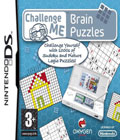Genre: Edutainment
Publisher: Oxygen Interactive
Developer: Oxygen
Release Date: May 18, 2009
The DS has been a remarkable device. Not only is it one of the top handheld systems in the market today, but it also engages people who had never played video games before. It easily predates the Wii for the "casual experience" that everyone seems so hot on right now, and it's most likely part of the reason for the Wii's current success. The DS' popularity is not all due to the classics that I grew up with — Mario, Zelda, etc. — but mostly because of the random brain training, language teaching, and everyday life skill titles that are available for the device. Some of these programs are a little suspect in quality, but they're popular regardless, so it doesn't come as much surprise to see a few more of these titles trickle down the line. I've already reviewed Challenge Me: Math Workout, but this review is going to be centered on the brain puzzle/Sudoku title, Challenge Me: Brain Puzzles.
I was ready to pass off Brain Puzzles as shovelware. The package design and overall presentation is pretty low-key, and I'm sure the game was made on a strict budget line, which at least carries over to the price point of the game. While I'm not much of a Sudoku fan, I was more than happy to see that the "picture puzzle" segment of the game was actually a Picross clone. Whatever you want to call it, there are about 500 Picross puzzles to complete in this title; you start off with monochromatic puzzles and extend into far more complex ones as you advance. Thankfully, the stylus control scheme ditches the "draw a number" system that's used in other like-minded games, and it allows you to just point and drag. If you've ever had a chance to play Picross DS, or perhaps something a little more obscure like Mario Picross, then you'll have a good idea of what to expect here. The Sudoku element is just icing on the cake, but the Picross portion really sells the game.
I know there are big Sudoku fans out there, and Brain Puzzles does a pretty good job with the puzzle sensation. Aside from the controls, it's pretty hard to screw up Sudoku, but the stylus controls work well enough here. The layout is instantly familiar, using nine 3x3 grids to fill in the numbers, and you can tap one block to bring up a small menu with the numbers to choose from. It color codes redundant numbers, so you'll instantly know if the number you selected is already present within the playing field, which is nice for those of us who are less observant than others.
The Picross controls are similar, but since it's color-based and you're basically making a picture by using the number guidelines provided, it's also slightly more complex. My only real issue with this section is that it's not explained well, so if you haven't played any form of the game before, you have no idea what the game is expecting you to do. There's nothing in the way of an in-game tutorial, and even the instruction booklet is pretty light on actual instructions, so I could see the game being quite frustrating to new players.
You can select your colors with the stylus, and then color in the blocks by touching them, or you can hold down the stylus and drag it over the blocks to color in multiple boxes at once. You can also highlight entire lines, and you can easily erase blocks by choosing the white option and re-tapping them. The puzzles are always timed (usually with a five-minute limit), but you can go over that limit in order to complete the puzzle.
There are a few different modes in the title, but the experience is pretty slim outside of the puzzle-solving. Brain Puzzles employs the use of a faux Brain Age system that keeps track of your progress and shows a chart of which section of the brain you're putting to use (it also looks like it's been ripped out of Brain Age). When you boot up the game for the first time, you create a basic profile with your name, and when you want to play either the picture puzzles or Sudoku, you can select from an option that will track your progress, or one that just acts as a free play mode. There's no difference in the puzzles that'll be available between the modes, and the brain tracking isn't particularly inventive or useful in any way, so you're probably better off skipping a few extra steps and sticking with the free play option.
Challenge Me: Brain Puzzles isn't a must-have game, even for Sudoku or Picross fans, but if you're a big-time puzzle player, it'll probably interest you. There are better versions of both games available on the DS, and in a few different formats too, but these certainly aren't bad examples of the genre. It's a shame that the presentation has to be so plain here, as it would have been nice to bring a few new people into the Picross fold. You should probably rent it to see if you like it before ponying up the full asking price, but then again, at a budget-friendly $19.99, you're not exactly breaking the bank if you pick it up. It's certainly fun in short bursts, but if you've never enjoyed Picross or Sudoku, this won't be the game that changes your mind.
Score: 7.0/10
More articles about Challenge Me: Brain Puzzles













 Challenge Me: Brain Puzzles, with its extended gameplay and variety of features, gives you the chance to test yourself while having fun.
Challenge Me: Brain Puzzles, with its extended gameplay and variety of features, gives you the chance to test yourself while having fun.
























